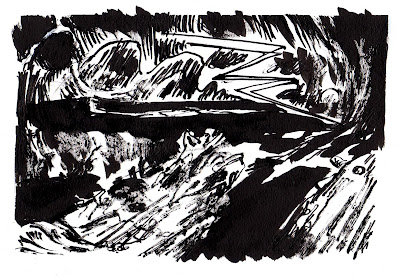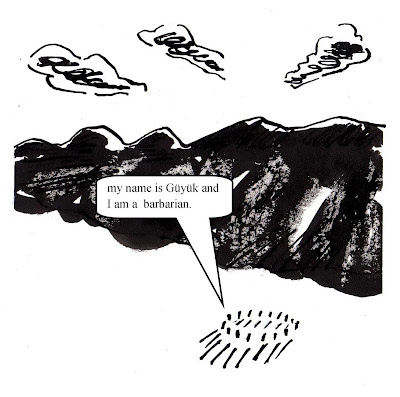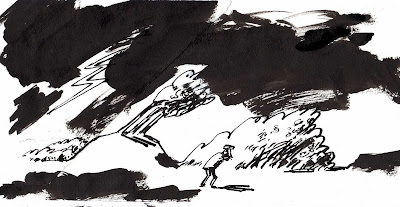Grey-faced Hawker sat in bed. The doctor had whispered to us in the hall “Catarrhal apoplexy, with involved ataraxia. I doubt he has long to live.” Swift and I stepped back into the hushed room, and sat at the bedside of the old man. He spoke to us in a broken voice from the side of his mouth.
“All my life,” he muttered, “I have known that the cloud of language floats above the physical landscape and has nothing to do with the real world of objects at our feet. And all I ever wanted was to make people aware of that fact! To let the popular novelists, the eye-gazing lovers, the earnest preachers, know that their 'veries' and 'reallies' and 'trulies' are to no avail. But the fools ...”
Reverend Hawker began to cough horribly.
“Do not speak if it hurts you,” said solicitous Swift. Impatient Hawker waved him away.
“... the fools wouldn’t listen. And why not? Because ...”
(Another access of fearful coughing.)
“... because I chose to show it to them by
jokes.” Suddenly Hawker’s eye alighted on me. (I! To whom, before that day, the Reverend had barely vouchsafed a word, except perhaps to ask where his shoes were, or else reluctantly to acknowledge a pun.) But now he grasped me by the hand: “Do not do as I have done, Jones. Take this lesson from me: If you spend your life telling people jokes, they will
not take you seriously. Why, even the most mediocre dabbling in tragedy will keep their attention longer than the finest joke you can think of. And why? Because every fool likes to feel they have a dose of the tragic in them! Whereas if you tell them a joke, they will laugh and, in laughing, forget all about it. And, just as surely, by the time the daisies open their petals in the rays of the morning sun, they will have forgotten all about you too ...”
*****************
It was some hours later when, from the darkened hallway, I heard voices. Swift was conferring with the doctor, and it was the former’s urgent tones that had drawn my attention. “Doctor, there is something I need to ask you, that has been troubling me of late. There are over 500,000 words in the English language, and yet we have to use the same word for our national sport, an insect that produces a note by rubbing its wings with its hindmost legs, and a footstool*. It doesn’t make sense.”
“It’s an unfortunate situation, Mr Swift, but it cannot be helped. There are simply more things in the world than there are words for them.”
“But if the words were allocated sensibly – for instance, if we had only
one word for tiredness – couldn’t we then use ‘fatigue’, ‘weariness’, ‘lassitude’, ‘languor’, ‘prostration’ and ‘exhaustion’ for other things? Would there be words enough then?”
The doctor shrugged.
“I must visit my patient, Mr Swift.”
Hawker was resting peacefully, only opening his eyes occasionally to reveal a look of unutterable horror. The doctor bent over him. To his enquiry, I replied that Hawker had only spoken a few words that afternoon, but those in the bitterest tone imaginable.
Swift came back in, clutching foreign dictionaries to his chest. “But if I used the words of European languages too? If I re-allocated them so that each one only represented one thing? But first, I suppose, I would have to know how many actual things there are in the world. Doctor, how many are there?”
The doctor shook his head.
“The patient needs quiet now, Mr Swift, and no unnecessary excitement.”
***************
Swift and I watched all night. In the rare moments when he returned to consciousness, Hawker’s mind wandered, among bitter regrets for a life wasted in wordplay and, in contradiction, among puns not yet explored. “Tussis, tussock, testes, toast,” he muttered. Even in the last hours of his diminishing spirit, the over-riding concern of his life would not let him go. Meanwhile Swift sat at a small table in the corner, studying the foreign dictionaries by candlelight. Around 2 a.m. a sudden sob from his direction caused me to turn around. Hands in hair, haggard-faced Swift stared at the table.
“It is impossible,” he gasped. “Even if there is a finite number of things in the world, the moment we start talking about them we find more things to say about them, and their number multiplies inexorably. It’s a dead loss the minute we start talking.”
“Then come and be silent,” I said.
It was in the hour before dawn that a change came over Hawker’s countenance. That old harsh face softened, and a new light seemed to shine in his eyes. It was as if he was gazing into a world beyond ours, and in this world – wherever it was – lay the answer to our paltry existence on earth. Peace finally came to the old man. He half-closed his eyes and the faintest of smiles played on his lips.
“It’s all just...” he murmured. Swift and I leaned forward to catch his words. Hawker exhaled heavily, and was silent for some moments.
“It’s all just a bit of fun,” he said.
They were the last words he ever spoke and, by the time the sun rose, he was dead.

 (from www.t-enami.org)
(from www.t-enami.org)


































